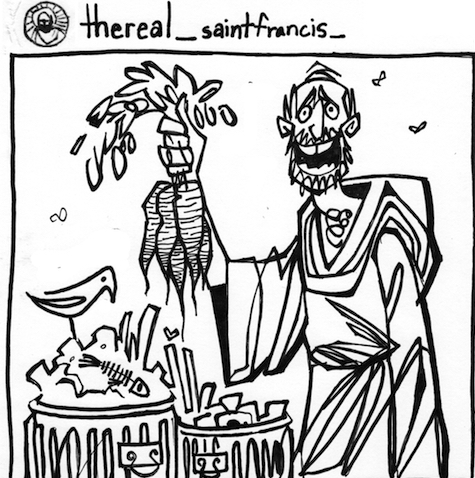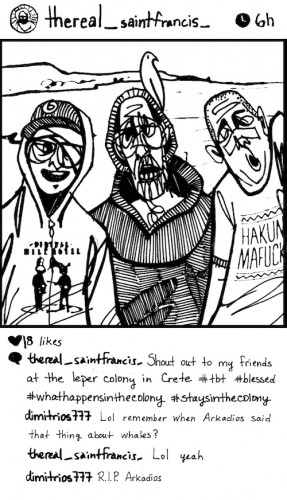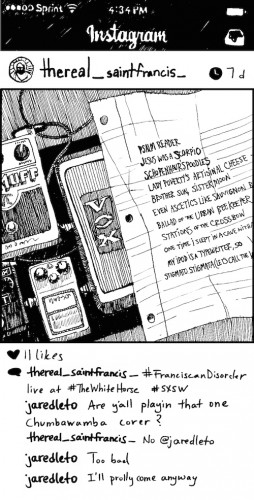
 1) After the seriously powerful interview Colbert conducted with Vice President Joe Biden, Quartz did a closer look on the guiding philosophy that helped Biden endure the loss of his son Beau. If you’ve not watched the interview, well, go ahead and do that, but Biden describes a note that his wife left him on his mirror, which read, “Faith sees best in the dark,” which comes from Kierkegaard.
1) After the seriously powerful interview Colbert conducted with Vice President Joe Biden, Quartz did a closer look on the guiding philosophy that helped Biden endure the loss of his son Beau. If you’ve not watched the interview, well, go ahead and do that, but Biden describes a note that his wife left him on his mirror, which read, “Faith sees best in the dark,” which comes from Kierkegaard.
Apparently, says Joel Rasmussen of Kierkegaard’s phrase, this is the paradoxical power of Christianity in the human occasion of suffering.
“One sees a kind of goodness coming out of this darkness but, as one of Kierkegaard’s pseudonyms often says, it’s by virtue of a leap. It’s a leap in rationality. One can’t argue one’s way, in a straightforward fashion, to a position of faith,” says Rasmussen.
Kierkegaard’s argument can be understood against the backdrop of Christian theology, adds Rasmussen. The idea of God dying on the cross is “scandalous” from a Biblical perspective and is “as dark a moment as one could really believe.” Yet it’s also “the full witness of God loving humanity,” says Rasmussen.
The passage from which this Kierkegaardian insight comes also describes the other end of the spectrum, too; that in moments of great rational “sagacity” or insight, we are in faith’s dark night. We have no ability to grasp the foolishness of faith’s promise when we can rationalize our way out of suffering. When we can’t seem to make heads or tails of our trouble, though, God extends his dark vision to us.
 2) Terry Gross has been reading our mail, apparently, or coming to our conferences in secret. In the last few days she’s interviewed both Mary Karr and Nadia Bolz-Weber on Fresh Air. Two fabulous interviews, which we can’t recommend listening to enough. A favorite segment from Nadia’s interview, about confession:
2) Terry Gross has been reading our mail, apparently, or coming to our conferences in secret. In the last few days she’s interviewed both Mary Karr and Nadia Bolz-Weber on Fresh Air. Two fabulous interviews, which we can’t recommend listening to enough. A favorite segment from Nadia’s interview, about confession:
“I am more tortured by the harm I’ve caused myself and other people and by my own secrets, than by some list of no-nos, the no-nos I’ve done in my life. I want people to feel free. And so, to confess is to lay these things down that are weighing us down. To speak these things out loud with a trusted clergyperson, who can then remind us who we are, and that God’s grace is actually that much more powerful than our ability to make mistakes. To me, it’s all about freedom.”
3) There have been more than enough feature essays on the mental health issues spanning elite college campuses, enough for it to begin to feel overcovered, or at least overgeneralized. But here’s one we missed, and it says something interesting about the issue that often gets overlooked. It reminds me a lot of the “narcissism of small differences” we’ve covered here before, that, regardless of one student’s standing in the world at large, a Big Fish surrounded by all the other Big Fish in a small, big-fish pond like Princeton, can only lead them to start comparing the small ways they’ve bettered one another.
Princeton seems to have worsened the issue by publishing student’s standings in their entire grade. Each kid is placed in a quintile, and it makes no sense for a child who has always been top ten in their class, to suddenly find themselves drowning in the bottom 20%, far from the way they’ve distinguished themselves before.
Every January a great team loses the Super Bowl. Every April three of the Final Four go down. And every September, extraordinary students arrive at highly selective universities only to discover that one out of every two really will wind up in the bottom half of the freshman class –and one out of every five in the bottom quintile.
“I think most people come in knowing that they’re going to do probably worse than they did in high school, but there’s a very big difference between knowing that and actually getting back your grades at the end of the first semester,” freshman Bharath Srivatsan told me. “You may have thought Princeton was going to be hard, but it’s unlikely you thought you were going to end up in the bottom quintile. So when you see that, that’s very, very jarring.” (A fate that did not befall Srivatsan.) Since 2004, when Princeton embarked on a campaign against grade inflation, the university has told students which fifth of their class their cumulative grade point average puts them in.
Contrary to generational stereotypes, these students are not precious snowflakes who’ve spent their youth receiving participation trophies just for showing up. They’re genuinely impressive — high achievers who’ve distinguished themselves, often in national or international competitions. They are so gifted and so diligent that they’ve rarely experienced obscurity or defeat before arriving as freshmen. They’re used to doing well, and to being known for their achievements.
4) Eerdman’s blog did a review on John Barclay’s new book, Paul and the Gift, which sounds like a must-read. Barclay talks about the distinction between prior Jewish understandings of divine generosity, and the way Paul’s theology breaks from that mold in his letters. For St. Paul, according to Barclay, God’s gift in Christ is never contingent on the receiver.
Central to Paul’s theology is the claim that God’s ultimate gift (the gift of Christ) is given regardless of worth — the worth of ethnicity, status, knowledge, gender, or virtue. This is what he discovers in his Gentile mission, and what founds his formation of innovative communities whose distinctive patterns of life bear witness to an event that has broken with normal criteria of worth. Such an incongruous gift subverts also Paul’s former allegiance to the Torah, since it loosens ties to all pre-constituted norms. If God’s central gift is given regardless of human criteria of worth, it fundamentally subverts not only pride in achievement but also confidence in the value systems by which we measure and allocate worth.
5) David Brooks misses the old Russia, apparently. Not one of his columns I would have clicked at by title, but he discusses the intense and wild “mental landscape” of historical Russia, much different from the Russia we imagine via Putin and the oligarchs. As opposed to the current center stage of the American political circus, Russian intellectuals valued the depths of the human soul, its inborn strength and weakness. While commercialism and industrialism were taking the modern world by storm, Russia continued in a counterculture of inner-diagnosis. Brooks laments the loss of this Russia.
In the Middle Ages, Russian religious icons presented a faith that was more visual than verbal, more mysterious than legalistic. Dostoyevsky put enormous faith in the power of the artist to address social problems. The world’s problems are shaped by pre-political roots: myths, morals and the state of the individual conscience. Beauty could save the world.
Even as late as the 1990s, one could sit with Russian intellectuals, amid all the political upheaval in those days, and they would talk intensely about the nature of the Russian soul. If it was dark in the kitchen at night, they wouldn’t just say, “Let’s replace the light bulb.” They’d talk for hours about how actually the root problem was the Russian soul.
6) The A/V Club picked this one up. Pixar’s SadLab, where high-velocity abreaction is manufactured and delivered through child-sized characters.
7) Last but not least, The Golden Age of Television takes on a new meaning when it faces the Paradox of Choice. Vox reports that, as television and all its technological subsidiaries (Netflix, Amazon, etc.) have now made more shows than TV has ever had, the question becomes whether the supply of choices will, in fact, paralyze us into inaction. As TV exec John Landgraf says, (ht BJ):
“I feel as though when you have more work than you can possibly do, you start to root as much for failure as success.”
Strays:
Artwork provided by @thereal_stfrancis_
The microaggression conversation continues.
Marilynne Robinson discusses the difficulty of being in solitude.

COMMENTS
2 responses to “Another Week Ends: St. Paul’s Gift, Princeton’s Fifth Quintile, Biden’s Kierkegaard, Russia’s Soul, Pixar’s SadLab, and the Peak of Television”
Leave a Reply













also the scholars who published the paper that has sparked the victimhood culture discussion have been contributing to the continued discussion… http://righteousmind.com/campbell-and-manning-respond-to-readers-comments/